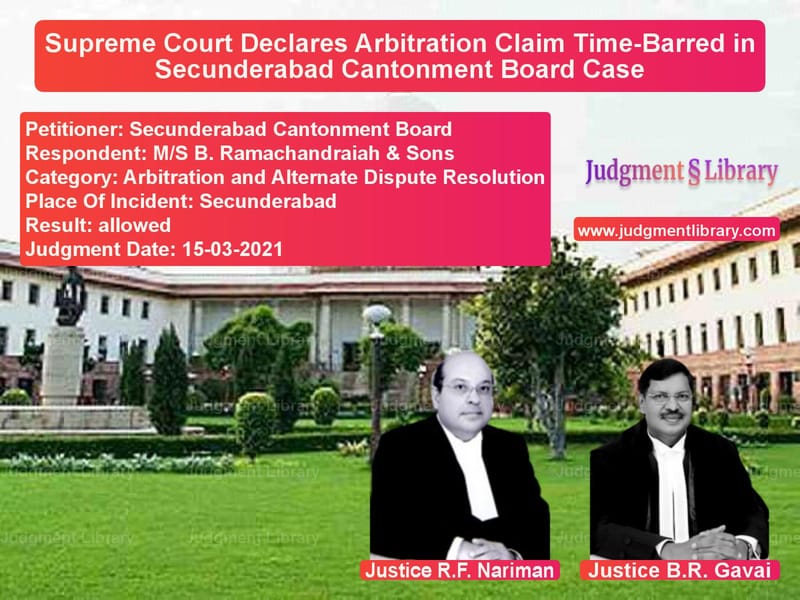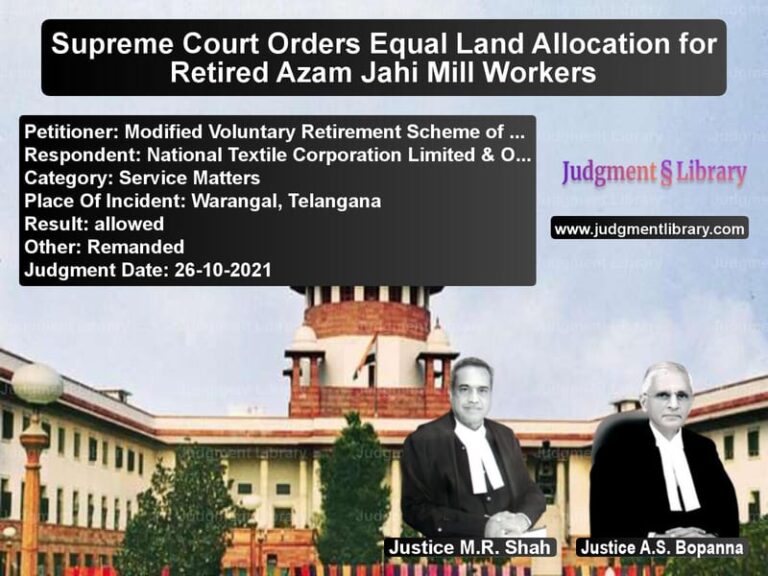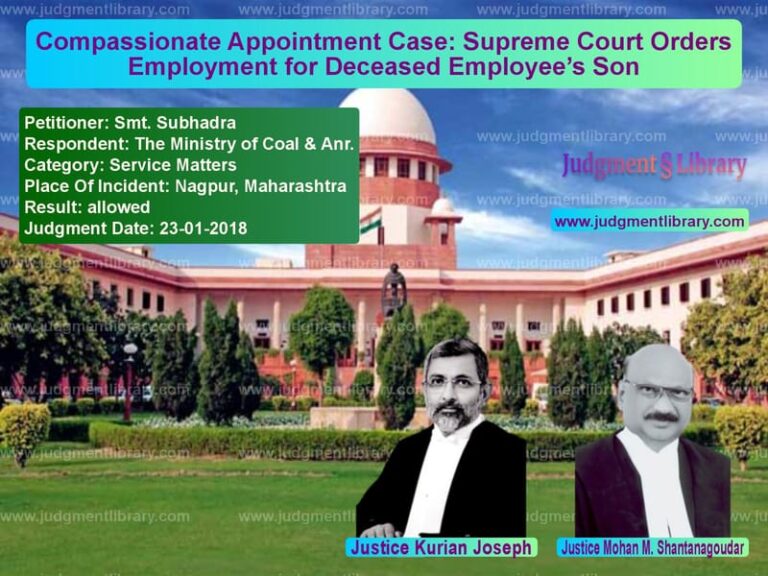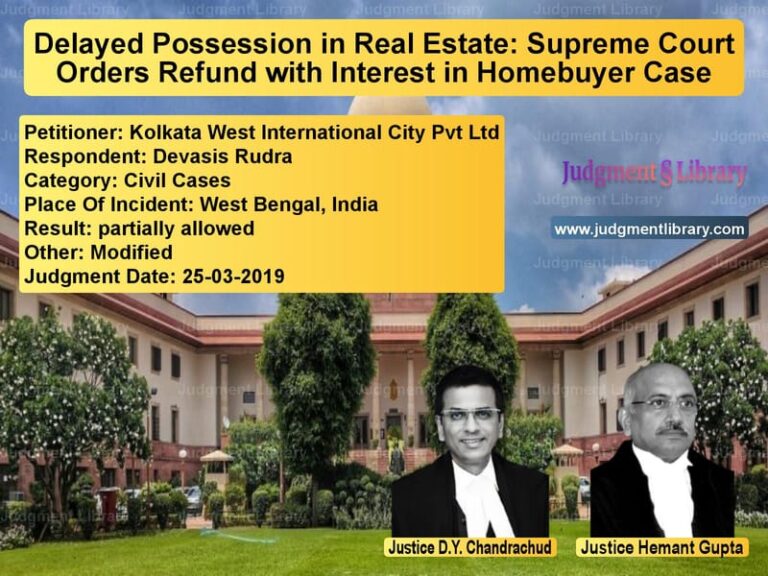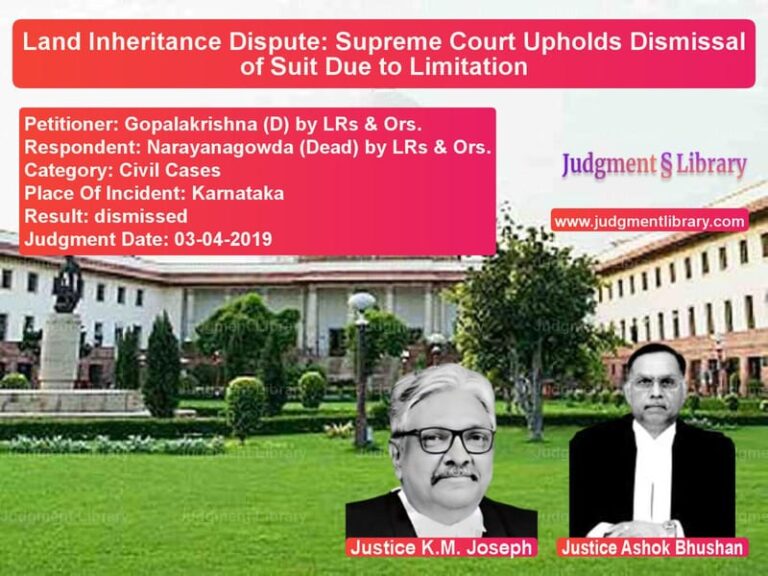Supreme Court Declares Arbitration Claim Time-Barred in Secunderabad Cantonment Board Case
The Supreme Court of India, in the case of Secunderabad Cantonment Board vs. M/S B. Ramachandraiah & Sons, ruled that the arbitration claim raised by the respondent was time-barred. The Court held that the claim, which originated from a contract dispute in 2003, was filed too late under the Arbitration and Conciliation Act, 1996, and the Limitation Act, 1963.
Background of the Case
The dispute arose from three contracts awarded by the Secunderabad Cantonment Board to M/S B. Ramachandraiah & Sons for road repairs. The agreements, signed in 2000 and 2001, contained arbitration clauses, stating that any disputes should be resolved through arbitration.
The respondent completed the work and received the final payments by 2003. However, in 2006, the respondent raised a demand for reimbursement of price variations, citing increased costs of materials, labor, and fuel. The Board did not respond, leading the respondent to invoke arbitration in 2007. Despite repeated letters between 2007 and 2010, no arbitrator was appointed. Finally, in 2013, the respondent filed an application under Section 11 of the Arbitration Act, seeking the appointment of an arbitrator.
Key Legal Issues
- Whether the arbitration claim was within the limitation period.
- Whether the respondent’s continued letters extended the limitation period.
- Whether the High Court erred in appointing an arbitrator despite the claim being time-barred.
Arguments by the Petitioner (Secunderabad Cantonment Board)
- The petitioner argued that the arbitration claim was barred by limitation as the cause of action arose in 2003 when the final payments were made.
- The respondent’s repeated letters between 2006 and 2010 did not extend the limitation period.
- The application under Section 11, filed in 2013, was filed well beyond the three-year limitation period.
- Reliance was placed on the Supreme Court’s rulings in Geo Miller & Co. (P) Ltd. vs. Rajasthan Vidyut Utpadan Nigam Ltd. and Vidya Drolia vs. Durga Trading Corporation, which held that limitation begins when a claim is first raised, not when it is rejected.
Arguments by the Respondent (M/S B. Ramachandraiah & Sons)
- The respondent argued that its claims remained alive as the petitioner never formally rejected them.
- It contended that the rejection letter in 2010 should be treated as the starting point for the limitation period.
- The respondent asserted that it had raised the issue multiple times, preventing the claim from becoming time-barred.
Supreme Court’s Observations
- The Court held that the arbitration clause required a request for arbitration to be made within the limitation period.
- It ruled that limitation started in 2003 when the final payments were made.
- The repeated letters by the respondent did not extend the limitation period.
- The respondent’s argument that the rejection letter in 2010 restarted the limitation period was incorrect.
The Court stated:
“Once time has started running, subsequent reminders or letters do not extend the limitation period. Allowing such an approach would indefinitely prolong disputes, contrary to the intent of the Arbitration Act.”
Supreme Court’s Final Verdict
- The Court allowed the appeal and set aside the High Court’s decision to appoint an arbitrator.
- It ruled that both the arbitration application and the underlying claim were time-barred.
- The Court reaffirmed that arbitration claims must be raised within the statutory limitation period.
Impact of the Judgment
- Clarity on Arbitration Limitation: The ruling provides clear guidance on when limitation begins for arbitration claims.
- Prevention of Delayed Claims: The decision discourages claimants from attempting to extend limitation through repeated correspondence.
- Strengthening Commercial Arbitration: The judgment reinforces the importance of timely invocation of arbitration.
Conclusion
The Supreme Court’s ruling in Secunderabad Cantonment Board vs. M/S B. Ramachandraiah & Sons sets a crucial precedent for arbitration law in India. By declaring the arbitration claim time-barred, the Court reaffirmed the principle that limitation laws must be strictly adhered to, ensuring timely dispute resolution. This decision will have a lasting impact on how contractual disputes are handled under arbitration agreements.
Petitioner Name: Secunderabad Cantonment Board.Respondent Name: M/S B. Ramachandraiah & Sons.Judgment By: Justice R.F. Nariman, Justice B.R. Gavai.Place Of Incident: Secunderabad.Judgment Date: 15-03-2021.
Don’t miss out on the full details! Download the complete judgment in PDF format below and gain valuable insights instantly!
Download Judgment: secunderabad-cantonm-vs-ms-b.-ramachandraia-supreme-court-of-india-judgment-dated-15-03-2021.pdf
Directly Download Judgment: Directly download this Judgment
See all petitions in Arbitration Awards
See all petitions in Dispute Resolution Mechanisms
See all petitions in Commercial Arbitration
See all petitions in Institutional Arbitration
See all petitions in Enforcement of Awards
See all petitions in Judgment by Rohinton Fali Nariman
See all petitions in Judgment by B R Gavai
See all petitions in allowed
See all petitions in supreme court of India judgments March 2021
See all petitions in 2021 judgments
See all posts in Arbitration and Alternate Dispute Resolution Category
See all allowed petitions in Arbitration and Alternate Dispute Resolution Category
See all Dismissed petitions in Arbitration and Alternate Dispute Resolution Category
See all partially allowed petitions in Arbitration and Alternate Dispute Resolution Category

